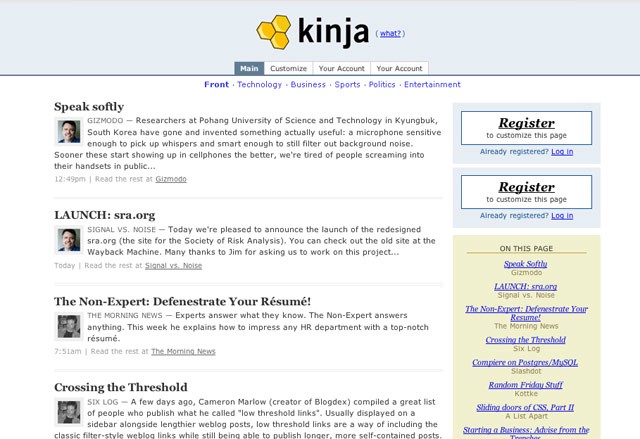Content, Management

Gawker Media’s editorial staff is now unionized. Despite a degree of public acrimony, the victory was wide: 80 votes to 27. Congratulations to the writers and editors of Gawker Media, who have submitted themselves to be the subjects of what is at the very least a worthy experiment.
Nick Denton, the company’s founder, is not a leftist. His professed politics do not align with vigorous labor organization. But he has been fairly quiet through this process, verging on supportive. He has offered no resistance. This is interesting! But perhaps makes sense. Ex-editorial director Joel Johnson published some pitched but valuable context in the comments of the victory announcement.
Congratulations, Edit!
I think unionizing was a smart, brave decision, and one that gives you a chance at security in a turbulent environment.
As it’s important to plan, negotiate, and plan to negotiate with as much clarity as possible, here is what I know about Gawker Media, the company. Bear in mind that my knowledge is at least six months out of date, except where it isn’t.
Gawker Media is an advertising-based business, with revenues of around 35- to 45-million dollars a year. There are a few other sources of income: a couple of million for international licensing fees (from the companies that publish international versions, such as Kotaku Australia); and affiliate fees, largely from Amazon, that add another 5–10 million a year. Ad revenue has been growing around 30% a year, which is good, despite relatively flat traffic and somewhat primitive (by Ad World standards) offerings. (No video at scale, negligible mobile innovation.)
Most of that revenue gets spent in the following ways: paying for staff; paying for infrastructure, such as web servers or bandwidth; litigating the ever-present lawsuits, often with third-party counsel; and paying for offices, travel, third-party services (like branding agencies and other consultants) and roof-top parties. That typically leaves a relatively tidy profit of 1–2 million dollars per quarter, which is either kept in a bank account or, recently, spent.
A large amount of Gawker Media’s capital over the last few years has been spent on the expansion of its technology divisions, with a roughly 50/50 split in headcount between the U.S. and Hungary. (The Hungarians and their office are, of course, less expensive than equivalent U.S. counterparts.) That is part of the reason why, when asked what Gawker Media has “spent on Kinja,” Denton is keen to equivocate. Little of the capital spent on Kinja has gone to materiel, since, after all, it’s just code running on servers that were already needed to operate the sites. As an relatively uninformed estimate, it is reasonable to presume that something like $10-$20 million has been spent on the development of Kinja (and its precursors) in payroll alone over the last five years. It’s difficult to make a clear estimate, primarily because it’s difficult to quantify the opportunity losses: how much traffic and potential advertising revenue was lost when the sites were down? How many employee hours were wasted pursuing partnership deals that were abandoned? How much of the development cost of Kinja was wasted in pursuit of dead-end experiments or capricious strategy charges versus the work essential to maintain an online media company’s content management system? (I can take a good guess at that last one, actually: I’d say about 75% of the work on Kinja has wasteful.)
As stewards of your own future at Gawker Media, it’s important to have a full understanding of the business strategy (or lack thereof) of Kinja. The theory, as it has mutated, goes something like this: Facebook and other social platforms (but mostly Facebook) have taken away the power of the “destination” publication. Buzzfeed, having noted this a few years back, has built a stateless organization that attempts to optimize the delivery of its traffic wherever the audience may be: on Facebook, on YouTube, on YouTube on Facebook. Gawker, feeling threatened by Facebook, attempted to build another Facebook. (Oops!) A noble goal, vis a vis the loss of independence or influence a media organization has over its own audience, but one that — even with a brilliant design and flawless technical execution — had a slim chance of success to begin with.
And it goes on. It’s very interesting. Did you know that Jezebel was sort of for sale, sort of, at one point? Me neither. Can’t wait to see how Denton responds! (Update: here.)
Anyway: Employees on both sides of the vote could point to this comment and yell, “SEE???” (Dev employees could also point at everyone and fairly yell, “WELL FUCK YOU TOO.”) But it’s most interesting for the way it reframes the discussion about unionization as one about who is going to do some specific and inevitable firing when it comes time to either trim fat or to dramatically reconfigure the entire business model to suit an internet that daily inches closer to rejecting it.
It also casts Denton’s amicability in a slightly different light:
@hamiltonnolan I’ll get all German on you. Co-determination. Share the revenues transparently; share the responsibility. It can work.
— Nick Denton (@nicknotned) June 4, 2015
Let’s say you’re the head of a large and well-staffed internet company and you sense that the tides are changing. You have a plan, you think, to survive or even thrive, but understand that the near future may turn out to be painful. You are also very nervous about some pending lawsuits. You’d probably prefer to be able to hire and fire without any friction, but you can also recognize the appeal of handing over a spreadsheet of alarming numbers to a newly appointed union leadership, blaming Facebook or a large settlement or the inertia of your very expensive move, all of which may become pressing issues at the same time, and saying, “you help deal with this.”
Image: A 2003 mockup of the original concept for “Kinja” Headline by the genius Rebecca Frank.
